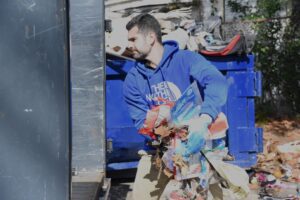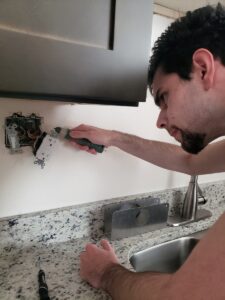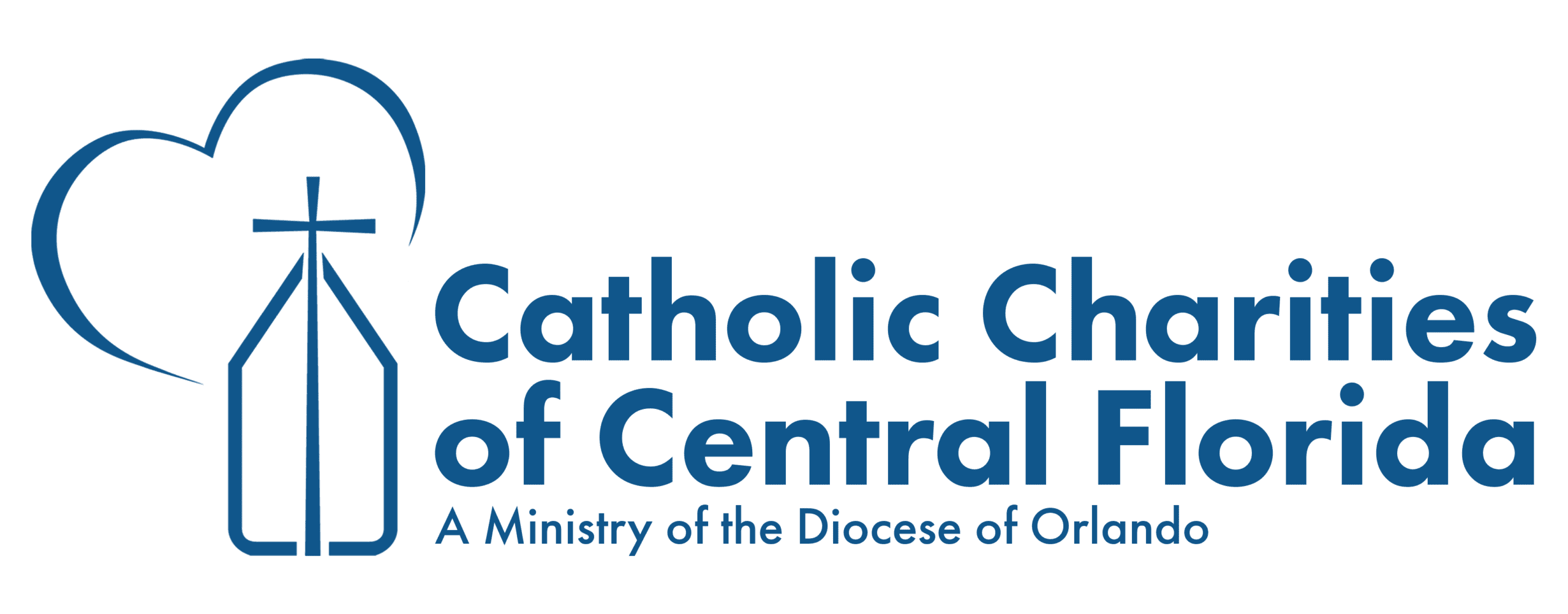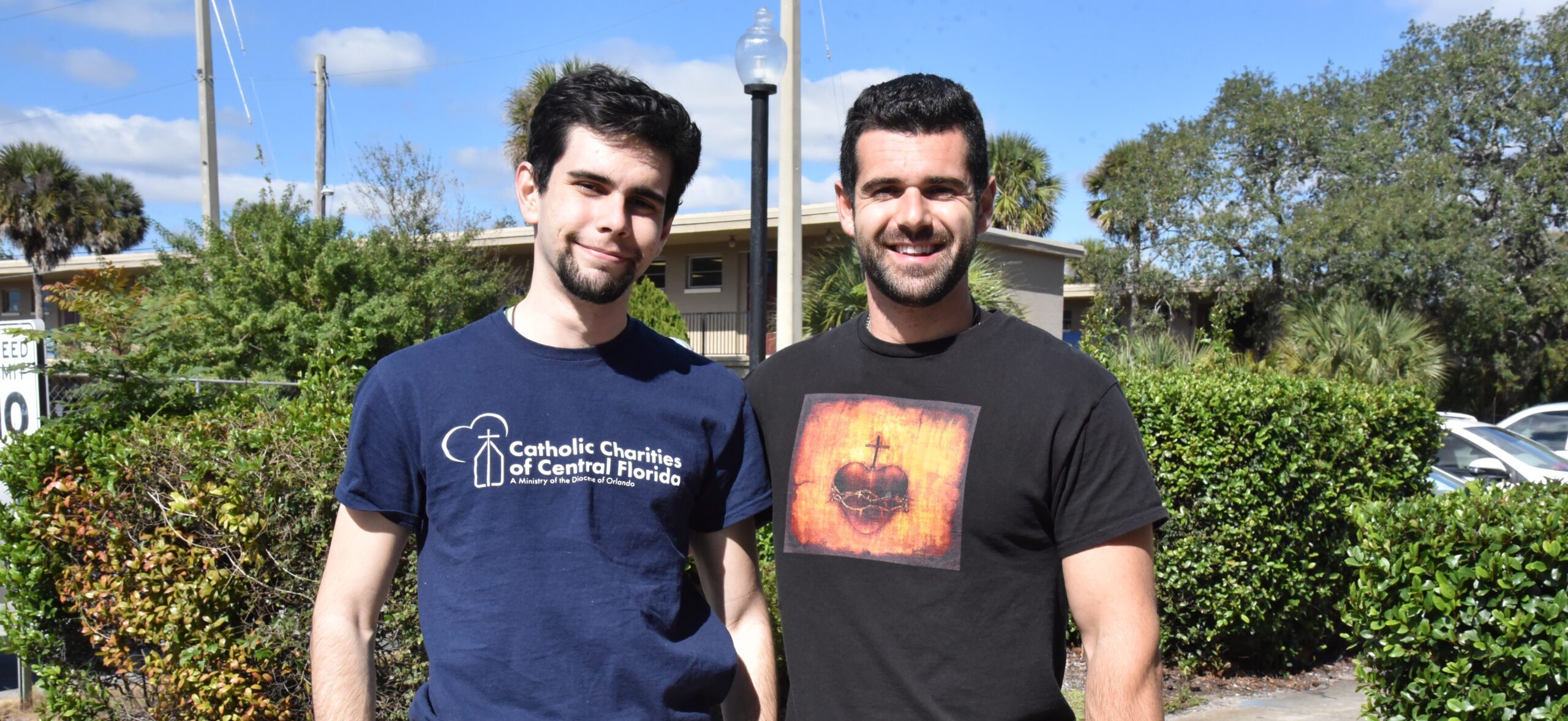Seminarians discover first-hand elements of poverty as they serve Catholic Charities.
ORLANDO | The first day seminarians Anthony Cabrera and Marc D’Angelo rode the bus to Catholic Charities of Central Florida in Orlando from Holy Redeemer Parish in Kissimmee, it took four hours. It was hit and miss until they figured out the bus and train schedules.
Their experience is part of the new poverty immersion program for young men discerning priesthood. Feeding the hungry, working on affordable housing and relying on the charity of others are also part of the propaedeutic program designed to lead first year seminarians to fully trust in God’s will.
Catholic Charities of Central Florida President Deacon Gary Tester has longed for such a program for years. His friend, Father Miguel González, shared one of his greatest seminarian experiences was being able to spend a summer at Catholic Charities. Deacon Tester hoped he might be able to offer that opportunity again.
“It’s like paying it forward,” he said. “To give them insight into their potential pastoral responsibilities is phenomenal.” He was happy to help the seminarians better understand the call of the priesthood and what it would mean as a priest to oversee, support, lead or guide a parish in recognizing the poor and the vulnerable in that parish community, “both inside and outside the walls.”
“The idea is not only are they going to serve the poor (through ministries such as Catholic Charities), but also going forward to trust in providence to live more simply,” explained Father Kevin McQuone, Director of Propaedeutic Formation at St. Vincent de Paul Regional Seminary in Boynton Beach. “It’s to give God the space to provide what is normally provided to them in their seminary training – so they can give the Lord a chance to surprise them and console them, knowing He will take care of them.”
D’Angelo, from the Diocese of Charleston, South Carolina, and Cabrera, from the Diocese of Venice, are among six seminarians participating in the poverty immersion program. They were sent two by two, just as Christ sent out the apostles.
“The goal is that they come back having grown in confidence, recognizing Jesus in their work and with greater trust in the Lord’s care for them and in our spiritual poverty,” said Father McQuone.
To help them in their journey he sent them with a book, He Leadeth Me — about a priest who went on mission to Russia “and had a very difficult experience of providence which was very purifying for him,” Father McQuone said. “He grew to understand, no matter what I think about Plan A — we are always on Plan A. As hard as that is to accept sometimes — nothing went wrong when things didn’t go according to what was really my plan.”
Equipped with the saints they chose to assist and guide them — St. Francis of Assisi, St. Francis Xavier, Our Lady of Perpetual Help and Our Lady of the Seat of Wisdom — the seminarians set off for central Florida.
Living at Holy Redeemer Parish in Kissimmee, the seminarians could take advantage of working in the onsite Catholic Charities food pantry, learn to figure out their transportation routes to Catholic Charities’ main office in Orlando, and witness the bus commute many impoverished people face daily.

Arriving with $60 for a bus pass and roughly $50 per week for food, they soon discovered bus and train passes cost much more. Without the generosity of Juan Vega, director of food ministries at Catholic Charities, and his volunteers, they would come up short on food as well. “They were extremely generous,” Cabrera said. “What we ate depended on the generosity of the people we encountered there.”
The seminarians experienced the same love as everyone else in the food lines and prayed for everyone they encountered at church and on the road.
“That was a huge part of this experience — being a witness to what we saw in public transportation,” D’Angelo said.
Cabrera said being at the mercy of their circumstances made him realize what he took for granted. “That experience of poverty provided real moments of solidarity,” he said.
One day he noticed a man having difficulty getting off the bus who seemed to be arguing with the bus driver. He wondered if God wanted him to help.
“I’ve always wanted to lean into certainty,” Cabrera recalled. Ultimately surrendering to the unknown, he spoke to him after the two exited the bus. Learning the man had done time in prison and his release found him falling on hard times, Cabrera listen and prayed with him. His surrender opened him to God’s will. “We had some beautiful moments of prayer that way. And all these people in my encounters were very open to the Holy Spirit, very open to Christ. It was beautiful.”

Still, Cabrera admits he struggled with uncertainty. “I had to pray over this extensively,” he said explaining he is a person of routine and order. He said he discovered in prayer what truly matters is found in “listening – to giving my heart in this way because I can make something out of that too,” he said. “God is driving at every moment.” It was something God used throughout his entire experience, he said.
He also felt this when working to serve others, often not being able to provide for their specific need. It reminded him of a phrase told to him by Deacon Wilmar Rojas, Catholic Charities Director of Operations. “Creative compassion”, meaning, “I can’t give them what they want right now, but what can I give them?” Cabrera said, “I can take that with me throughout the seminary, and God willing, when I’m ordained.”
He recalled accompanying Deacon Rojas to a home shot up by a gang. Outside a fence hung askew and tread marks sliced across the lawn. The single mother living there was working hard to launch her business while raising her son. Although Cabrera could do nothing himself to change the situation, he and Deacon Rojas did share a basket of food. It would suffice for the moment.
The challenging lives many people live also became clear to D’Angelo. Riding the bus he thought, “It’s not just that people are at the mercy of delays and having to wait long periods of time, or having to do that ride, but just the sadness in people.” He recalled a single mother yelling at her young children on the bus, the three curled up in a ball, retreating under their hoodies.
“Anthony had his breviary open and it was as if the little girl almost knew that was prayer and God was somehow being praised in those words,” D’Angelo said. “She kept looking at us and that eye contact felt like she was saying, ‘Help me. I’m not living right.’ When children are vulnerable like that, it breaks your heart.”
D’Angelo said he felt the Holy Spirit revealing “the hurt in the world.” He had to let go of “judging the circumstances as what he thought they were,” he said. “It was a challenge to surrender deeply to the will of God and be like a child – to accept everything when it came, to be grateful and accept it as grace… I learned to be bold, to be confident, to have faith that I am in the mystical body participating in God’s nature. It is not for me to dictate the outcome but to have assurance in Christ and His victory.”
Catholic Charities will host the next set of seminarians in January 2025.
By Glenda Meekins of the Florida Catholic staff, February 01, 2024

